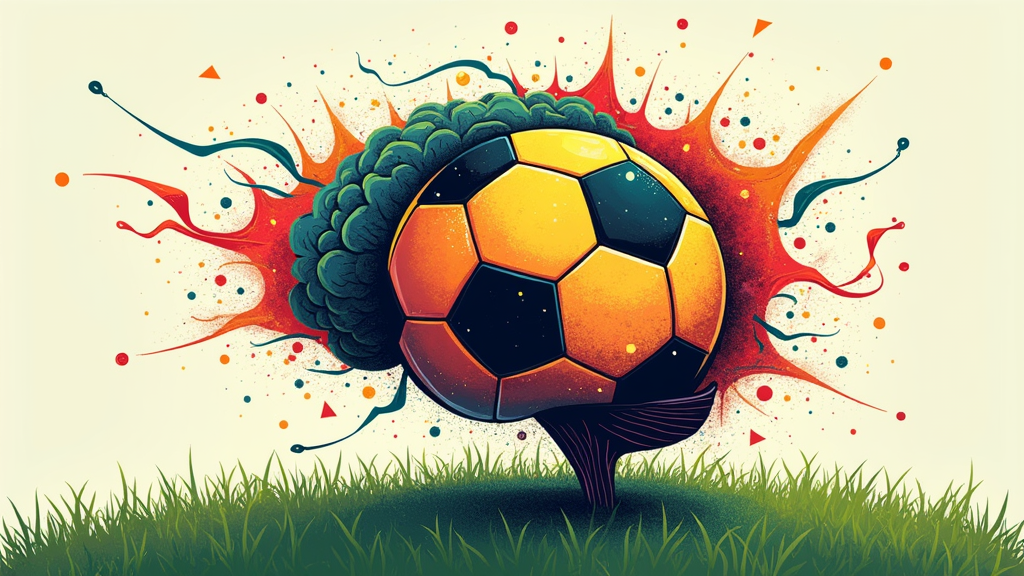Soccer is a sport that goes far beyond physical skills and technical abilities. The mental strength of a player can determine the outcome of a game. I have found that building mental toughness is as important for enjoying the game as it is for excelling on the field. In this article, we are checking out mental toughness in soccer and what it takes to perform under pressure and bounce back from setbacks. Over the years, players have discovered that the mind is just as important as the body, and training your mental skills can often be the difference between winning and losing.

Essential Elements of Mental Toughness in Soccer
Mental toughness is often seen as the ability to stay focused and resilient under pressure. In soccer, this means maintaining your composure during high-stakes moments and overcoming the stress that can come with competition. The game demands a blend of concentration, determination, and confidence that develops over time through practice and reflection.
Understanding the importance of mental strength is a game-changer for players at all levels. It helps in decision making, controlling emotions, and even in teamwork dynamics on the field. Many coaches now place as much emphasis on psychological training as they do on physical drills. This switch stems from the realization that mental resilience can be just as influential as physical prowess in winning matches.
Continuous practice to handle pressure, adapt to spontaneous changes, and overcome mistakes turns mental toughness from an abstract idea into a practical skill that can be honed and perfected. Over time, players who take the time to work on their mental game often find they are better prepared to handle unexpected moments during matches. This extra focus has allowed many to not only improve their performance but also enjoy the game on a deeper level. To truly succeed, players should remember that every training session and match is an opportunity to refine both body and mind.
Getting Started with Building Mental Toughness
Before stepping into the next game, it pays to understand the basics of mental toughness. For new players, developing a resilient mindset might seem challenging. Yet, by starting with some straightforward strategies, you can set a strong foundation for mental strength that will grow with your experience.
Beginners should start by setting clear, personal goals and committing to routines that nurture focus. The idea is to create habits that help reduce nervousness and build a sense of control. Here are a few key techniques to get familiar with:
- Visualization: Imagine different game scenarios where you overcome obstacles and emerge victorious. This mental rehearsal can increase confidence and prepare you for real-life challenges.
- Mindfulness: Practice staying present during training sessions and games. Focusing on the moment can help reduce anxiety and improve concentration.
- Goal Setting: Set realistic, progressive objectives that keep you motivated and allow you to track improvements over time.
Additionally, dedicating time each week to review your performance through self-reflection can provide further clarity. Writing down your progress, challenges, and feelings after each match can help you identify patterns and build strategies that work best for you. This simple habit not only builds confidence but also strengthens your mental resolve over the long haul.
Common Challenges in Nurturing Mental Strength
No ride towards mental toughness comes without its hurdles. In the process of building mental resilience, players might face various challenges that test their resolve. The following sections explore some of the common obstacles encountered when trying to develop a tougher mental game.
Managing Pressure
Pressure is an inherent part of competitive soccer. It shows up during penalty kicks, key game moments, or even during training when expectations run high. Many players struggle with the fear of failure or overthinking when faced with critical situations. To overcome pressure, it helps to focus on your established training routines and trust in your preparation. Practice under simulated high-pressure situations to get used to the sensations of stress, gradually reducing its impact over time. A well-practiced mental routine can make even the most nerve-wracking moments seem manageable.
Handling Criticism and Setbacks
Criticism can come from teammates, coaches, or even from self-imposed expectations. Learning to accept and benefit from criticism without letting it diminish your confidence is very important. Each setback is an opportunity to pick up new insights about your strengths and areas where you can improve. Reflecting on mistakes allows you to build a stronger mindset that is ready to face adversity head on. Embracing criticism as part of the growth process can transform challenges into stepping stones for future success.
Maintaining Focus During Long Matches
A match can last 90 minutes or more, and keeping a sharp focus over an extended period is not easy. Mental fatigue can slow down your ability to make quick decisions, which may affect the overall outcome of the game. Taking short mental breaks when possible and using simple cues like deep breaths can help reset your concentration. Practicing specific concentration drills during training sessions improves your ability to stay engaged even when the game stretches the limits of your endurance. By pacing yourself mentally, you put yourself in a better position to respond quickly and effectively during key moments.
Dealing with In-Game Setbacks
Missing a crucial pass or conceding a goal can sometimes shake a player’s confidence. Instead of allowing these moments to derail your overall performance, developing a routine to recover quickly is very important. Whether it’s refocusing on your specific role, revisiting long-term objectives, or even using a physical trigger such as a deep breath, having a plan in place lets you bounce back swiftly. This proactive approach helps maintain composure and builds a sense of control even in the midst of in-game challenges.
Understanding these challenges is the first step to overcoming them. With careful planning and constant self-review, you can reduce the influence these obstacles have over your performance. Every challenge met is another opportunity to grow stronger mentally, making you better prepared for the next high-pressure situation.
Advanced Tips and Tricks to Give a Boost to Mental Toughness
Once the basics are in place, it’s time to set higher goals and refine your mental skills further. Advanced mental training methods can offer significant benefits, especially when regular training and match pressures intensify. Getting involved in drills that simulate diverse game scenarios can be particularly effective in building your mental stamina.
Practice Situational Simulation: Get involved in drills that simulate high-pressure game moments. This might include practicing penalty kicks when tired or under time constraints. Repeated exposure to stressful situations can help you learn how to react instinctively with calm and clarity, turning anxiety into a manageable force over time.
Develop a Pre-Game Routine: A consistent routine before the game can be a great way to prepare mentally. Whether it involves a set sequence of warm-up exercises or taking several quiet moments to clear your head, consistency in your approach helps set you at ease by clearly outlining what comes next. This reassurance makes it easier to transition from practice to performance under pressure.
Embrace Self-Reflection: Taking time after each match to reflect on both successes and areas for improvement is essential. Writing down your thoughts, discussing your performance with a trusted friend or coach, or even recording a short video diary can offer insights that might otherwise be missed. This extra self-review time builds your awareness and allows you to fine-tune your strategies for future games.
Build Resilience Through Challenges: Instead of shying away from tough situations, use them as opportunities to learn and grow. Tackle challenges that push you out of your comfort zone so that over time, those mental hurdles become less intimidating. Consistently facing your fears head on will gradually build a resilience that benefits not just your game, but your overall outlook on challenges in life.
These advanced strategies require dedication and regular practice, but they ultimately reward you with greater mental endurance and confidence. By mixing together these techniques, you form an all-in-one skill set that prepares you for any high-pressure scenario the game might throw your way.
Fundamentals: Daily Techniques to Improve Mental Toughness
Regular practice of mental drills works wonders for your game. Just as physical conditioning demands consistent workouts, mental toughness benefits from daily exercises. Practical routines that fit within even the busiest schedule can transform your on-field performance by keeping your mind sharp and focused.
The daily techniques outlined below are simple yet effective methods to build mental strength over time:
- Mindfulness Meditation: Spend a few minutes each day in quiet meditation. Focusing on your breathing or the subtle sounds around you can center your mind and help reduce overall stress levels.
- Routine Visualization: Dedicate time daily to visualize successful outcomes in various challenging scenarios. This habit trains your mind to react more positively when actual game pressure arises.
- Progressive Goal Setting: Establish small, realistic goals each day. Celebrating these minor victories helps maintain motivation and reinforces a positive mindset.
- Journaling: Keep a daily log of your thoughts, successes, and setbacks. Over a period of weeks and months, this record provides a clear picture of your growth and helps you pinpoint areas that might need extra care.
In addition to these methods, consider incorporating brief mental resets between training drills. Even a one-minute pause to stretch and breathe can make a significant difference in maintaining focus throughout busy sessions. This habit not only builds a sharper game-day mentality but also teaches you to manage stress in everyday situations.
Frequently Asked Questions
Below are some common questions that players and enthusiasts often have about mental toughness in soccer:
Question: What exactly is mental toughness in soccer?
Answer: Mental toughness involves the ability to stay composed under pressure, recover quickly from setbacks, and maintain focus throughout the match. It is as much a part of training as physical skills and is developed through consistent practice and thoughtful reflection.
Question: How can a player improve mental toughness?
Answer: Improvement comes from a mix of mindfulness practices, routine visualization, setting realistic goals, and always taking time for self-reflection. Over time, these habits help build a resilient mindset that can handle both internal doubts and external pressures.
Question: Are there specific drills to boost mental strength?
Answer: Yes, getting involved in simulated stressful conditions, keeping to a pre-game routine, and practicing mental exercises like controlled breathing and visualization drills are all effective in training your mind to better handle game pressures.
Question: What role does self-reflection play in building mental toughness?
Answer: Self-reflection helps you get a feel for your reactions, understand your strengths and weaknesses, and build strategies to manage negative emotions. It is a key part of learning and growing as a player.
Wrapping up
Mental toughness in soccer isn’t a mysterious trait; it is a set of skills that can be developed with intentional practice and persistent effort. Embracing routines that foster mindfulness, using visualization techniques, and setting clear, realistic goals can give a boost to your performance on the field. Amid the excitement and challenges of each match, maintaining a balanced mindset will help you excel and enjoy the game even more.
Every training session offers an opportunity to pump up your mental resilience. Focus on what you can control, learn from setbacks, and always work towards becoming a better version of yourself each time you step onto the field. By continuously refining both your physical and mental game, you not only improve your performance but also build confidence that transcends the sport, influencing other areas of your life as well.
Taking the extra time to review your progress, set new targets, and get involved in additional mental exercises will solidify your growth. Remember that mental toughness is a journey—an adventure where each challenge met is a chance to grow, learn, and ultimately shine on and off the field.
